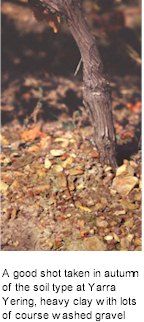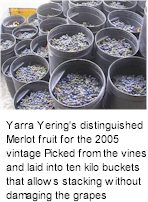


After a lengthy search for the penultimate terroir and microclimate, Dr. Bailey Carrodus chose a site in the Yarra Valley which seemed to meet all the requirements, grey silty clay loam with bands of gravel for good drainage, on a north-facing slope high enough out of the valley to avoid late spring frosts. The site has fulfilled all expectations producing a wide range of quality fruit, from Pinot Noir to Touriga Nacional for a fortified red wine. Most of the 12-hectare plot was planted in 1969 and the 1973 vintage was the first commercial wine produced in the valley since 1921.

The reputation of the valley in the 19th and early 20th centuries rested on Cabernet Sauvignon and Shiraz, and these were the main varieties planted, but it was essential to give Pinot Noir a go, and so a smallish area of that was in the first planting. These three grapes dominated the first three wines. Classically, Cabernet Sauvignon has always had companions, Cabernet Franc was excluded because the only Australian examples had an earthiness which was not wanted, so Malbec and Merlot were in the early plantings and later some Petit Verdot.
Shiraz on its own will develop the desired complexity with about ten years in bottle, but the Rhone Valley shows what some companions will do for it. The Yarra Yering winemakers tried some other Rhone reds, but had difficulty ripening them. Eventually they got their hands on Viognier, and there has been a small amount added to the No.2 Dry Red since 1984. Small amounts of whites were also planted, mainly for the winemakers own enjoyment, but the vineyard is predominantly red.
In 1988 four hectares of fifteen-year old Shiraz on adjacent land to the East became available and they are now known as Underhill. This quirky name is a rough translation of the name Prigorje which the previous owner had given it, in memory of the Croatian village from which he came.

The idea behind buying the Shiraz had been to increase the amount of No.2 Dry Red, but about the same time the EU recognized Yarra Yering as a viticultural sub-region in its own right, and this accolade meant that material from outside the original site could not blended.
The division of Australian vineyards into separate regions has now been reviewed and these restrictions luckily no longer apply. Later additions of 8 and 12 hectares have been incorporated into Yarra Yering.
A north-west facing slope has been terraced and planted with Portuguese grape varietals, mainly Touriga Nacional and Tinta Cao with some Roriz, Tinta Amarello, Souzao and Alvarelhao. The last addition of parcels is mostly planted to Cabernet and Shiraz, to meet the overwhelming demand for the two main blends. Other experimental plantings at Yarra Yering are Sangiovese and Barbera.

























